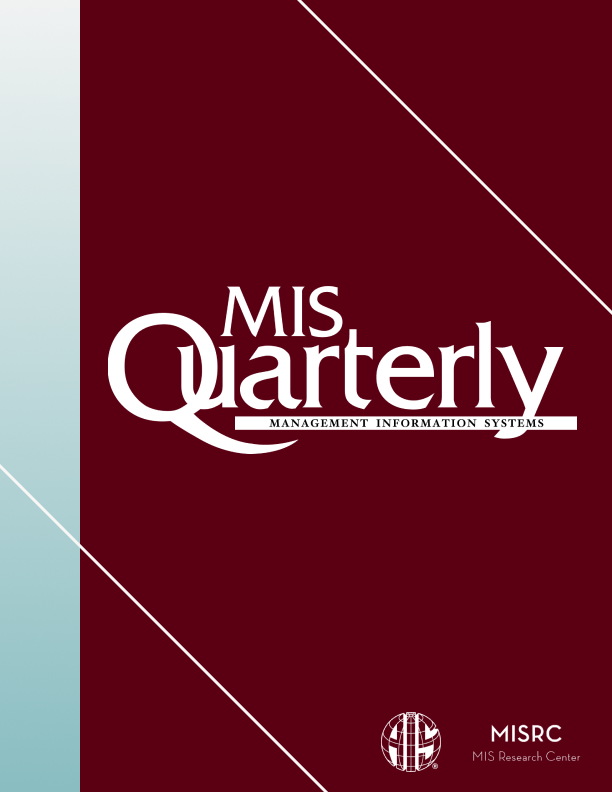Data Commoning in the Life Sciences
IF 7
2区 管理学
Q1 COMPUTER SCIENCE, INFORMATION SYSTEMS
引用次数: 0
Abstract
Datafication is driving organizations to invest in data commons not only to share the costs of data generation, analysis, and curation; but more importantly, to realize synergies in precompetitive research collaborations where private and public motives interact (i.e., semicommons). The fanfare surrounding datafication often hails the sophisticated algorithms used to develop large quantities of data toward greater insight, naïvely assuming that more data equals better data. Yet, for datafication in general and precompetitive research specifically, less attention is awarded to what actually constitutes data and evidence in the first place—that is, to its genesis, construction, and interpretation by heterogeneous scientific and commercial entities. We present the case of Open Targets, a precompetitive collaboration in the life sciences, where publicly funded research, nonprofit foundations, and for-profit pharma collaborate to generate and share data in genomics, proteomics, and bioinformatics. We theorize about the process of data commoning, a political activity in the semicommons where data are created, evidential value is assembled, and scientific meaning converges as data travels, or journeys across creators, validators, and users. Our findings highlight the effects of relational dynamics and political nature of data journeys: why these dynamics form, how they are manifest in a precompetitive semicommons, and what implications this can have for the mobility of data as shared, public good.生命科学领域的数据共享
#html-body [data-pb-style=UUUJO1V]{justify-content:flex-start;display:flex;flex-direction:column;background-position:left top;background-size:cover;background-repeat:no-repeat;background-attachment:scroll} 数据化正在推动各组织投资数据公共资源,这不仅是为了分担数据生成、分析和整理的成本,更重要的是为了在竞争前的研究合作中实现协同效应,在这种合作中,私人动机和公共动机相互影响(即,私人动机和公共动机之间的相互作用)。e.,半共享)。围绕数据化的大张旗鼓的宣传往往是对用于开发大量数据以提高洞察力的复杂算法的赞美,并天真地认为更多的数据就等于更好的数据。然而,对于一般的数据化和具体的竞争前研究而言,人们较少关注什么才是真正的数据和证据,即数据和证据的起源、构建以及不同科学和商业实体对数据和证据的解释。我们介绍了开放目标(Open Targets)的案例,这是生命科学领域的一项竞争前合作,由公共资助的研究机构、非营利基金会和营利性制药公司合作生成并共享基因组学、蛋白质组学和生物信息学方面的数据。我们对数据共用的过程进行了理论分析,这是半共用领域的一项政治活动,在这一过程中,数据被创建,证据价值被组合,科学意义随着数据在创建者、验证者和用户之间的旅行而汇聚。我们的研究结果强调了数据旅行的关系动态和政治性质的影响:为什么会形成这些动态,它们是如何在竞争前的半公共资源中体现出来的,以及这对作为共享公共产品的数据的流动性有什么影响。
本文章由计算机程序翻译,如有差异,请以英文原文为准。
求助全文
约1分钟内获得全文
求助全文
来源期刊

Mis Quarterly
工程技术-计算机:信息系统
CiteScore
13.30
自引率
4.10%
发文量
36
审稿时长
6-12 weeks
期刊介绍:
Journal Name: MIS Quarterly
Editorial Objective:
The editorial objective of MIS Quarterly is focused on:
Enhancing and communicating knowledge related to:
Development of IT-based services
Management of IT resources
Use, impact, and economics of IT with managerial, organizational, and societal implications
Addressing professional issues affecting the Information Systems (IS) field as a whole
Key Focus Areas:
Development of IT-based services
Management of IT resources
Use, impact, and economics of IT with managerial, organizational, and societal implications
Professional issues affecting the IS field as a whole
 求助内容:
求助内容: 应助结果提醒方式:
应助结果提醒方式:


